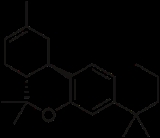
JWH-133
Overview
Dissociation constant
In chemistry, biochemistry, and pharmacology, a dissociation constant is a specific type of equilibrium constant that measures the propensity of a larger object to separate reversibly into smaller components, as when a complex falls apart into its component molecules, or when a salt splits up into...
of 3.4nM and selectivity of around 200x for CB2 over CB1
Cannabinoid receptor type 1
The cannabinoid receptor type 1, often abbreviated to CB1, is a G protein-coupled cannabinoid receptor located in the brain. It is activated by endocannabinoid neurotransmitters including anandamide and by the compound THC, found in the psychoactive drug cannabis.-Expression:The CB1 receptor is...
receptors. It was discovered by, and named after, John W. Huffman
John W. Huffman
John William Huffman is a professor emeritus of organic chemistry at Clemson University who first synthesised many novel cannabinoids, including JWH-007, JWH-015, JWH-018, JWH-019, JWH-030, JWH-051, JWH-073, JWH-081, JWH-122, JWH-133, JWH-147, JWH-171, JWH-182, JWH-203, JWH-210, JWH-250, JWH-307,...
.
JWH-133, alongside WIN 55,212-2
WIN 55,212-2
WIN 55,212-2 is a chemical described as an aminoalkylindole derivative, that produces effects similar to those of cannabinoid derivatives such as THC but has an entirely different chemical structure....
and HU-210
HU-210
HU-210 is a synthetic cannabinoid that was first synthesized in 1988 from -Myrtenol by the group led by Professor Raphael Mechoulam at the Hebrew University. HU-210 is 100 to 800 times more potent than natural THC from cannabis and has an extended duration of action...
, is implicated in preventing the inflammation caused by Amyloid beta
Amyloid beta
Amyloid beta is a peptide of 36–43 amino acids that is processed from the Amyloid precursor protein. While it is most commonly known in association with Alzheimer's disease, it does not exist specifically to cause disease...
proteins involved in Alzheimer's Disease
Alzheimer's disease
Alzheimer's disease also known in medical literature as Alzheimer disease is the most common form of dementia. There is no cure for the disease, which worsens as it progresses, and eventually leads to death...
, in addition to preventing cognitive impairment and loss of neuronal markers.
Unanswered Questions

